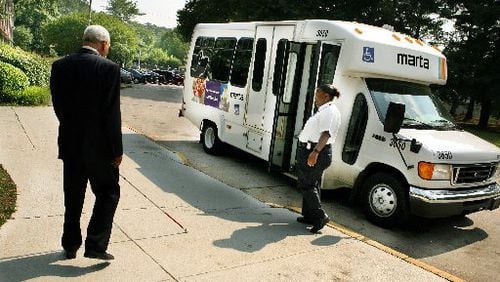An arbitration board has overturned MARTA’s decision to outsource its bus service for the disabled and elderly to a private company – a move the agency says could lead to poorer service at a higher cost.
MARTA decided to outsource its paratransit service in 2015, citing the need to save money, increase efficiency and improve on-time performance rates. A private company – MV Transportation – has been operating the service since last spring.
BACKGROUND: MARTA paratransit riders voice concerns
FULTON COUNTY: MARTA plans expansion
Paratransit service allows people who can’t use regular transit service to schedule rides on special buses. Last year, the paratransit service saw more than 670,000 passenger boardings, according to Federal Transit Administration statistics.
The Feb. 3 arbitrator's decision gives the agency 100 days to bring the operation back in house. That means the agency will need to hire hundreds of bus drivers in coming weeks – though many of its former employees now work for MV Transportation.
The decision is a victory for the Amalgamated Transit Union, which says MARTA's decision to outsource the service violated the terms of its labor contract. Stanley Smalls, a union officer, said customers also will benefit from having experienced, well-paid drivers.
“It’s a victory for everybody that was affected by this outsourcing,” Smalls said.
In a written statement, MARTA said it is “reviewing the arbitrator’s decision before deciding next steps.” It could appeal the decision to Superior Court.
In the arbitration dispute, MARTA argued that “any effort to undo the contract with MV (Transportation) will adversely affect MARTA’s service to its most vulnerable customers.” It also said the move would “have enormous and negative financial consequences.”
It’s unclear how much money – if any – MARTA has saved by switching to a private contractor. MARTA’s paratransit budget increased 11 percent to $25.2 million this year.
In written responses to The Atlanta Journal-Constitution's questions, MARTA said several factors – including increased ridership and rising employee wages – contributed to the budget increase.
Joseph Erves, MARTA’s senior director of operations, said the first year of outsourcing includes one-time expenses that would reduce savings.
“The full benefit of the cost savings will not be achieved until we get closer to full implementation of all changes/improvements,” Erves said in a written statement.
The agency also said cost savings were just one factor it considered when it decided to outsource the service. Other factors included improved technology that would help improve customer service.
The arbitration board voted 2-1 in favor of the union. Among other things, it cited evidence that MARTA’s chief aim in outsourcing paratransit service was saving money on employee pay and benefits – in essence, avoiding its obligations under the labor contract.
Some customers have complained for years that the service is unreliable. According to MARTA, last spring paratransit buses, on average, were late to pick up passengers one out of every five times.
In recent months, performance has improved. In November, paratransit buses arrived on time 90 percent of the time.
But problems remain. Next month, MARTA will appear in federal court to show why it shouldn't be held in contempt for violating a provision of the federal Americans with Disabilities Act.
Ken Mitchell, a disability rights advocate and MARTA customer, said paratransit buses have been on time more often in recent months. But when they’re late, they’re often later than before, he said.
Mitchell welcomed the arbitration board’s decision. He said it’s better for the service to be operated by a public agency, rather than a private company.
“We can’t give a public service to a private entity,” he said. “Its mission is to make money, by definition. The public mission is to provide service. It’s tough to make those two mesh.”
About the Author







